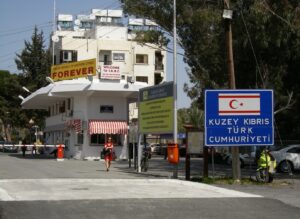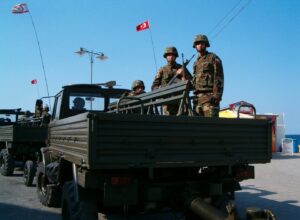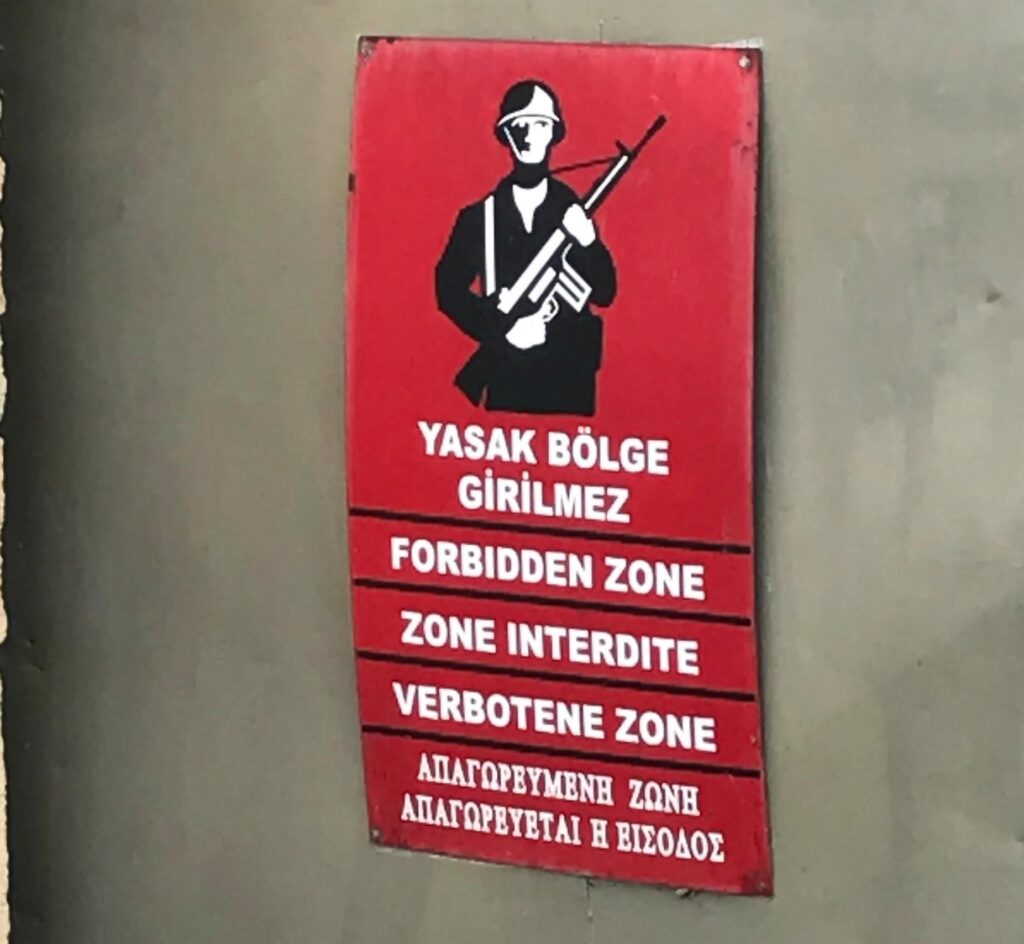International Recognition for Northern Cyprus: Much Ado About Nothing?
When the Turkish Cypriots elected their president in October 2020, they were not simply choosing a figurehead for the next five years, but rather a vision for the future of Northern Cyprus. As the chief negotiator in the Cyprus peace talks, the president holds considerable leverage in conflict resolution. In what clearly mirrors the underlying fragmentation of the Northern Cypriot society, the two candidates facing off in the second round of the election represented opposing viewpoints.
The incumbent president Mustafa Akıncı supported the continuation of the talks based on the model of a bi-zonal, bi-communal federation. For decades, this has been a solution supported by international actors, yet it has failed to manifest in a specific plan acceptable to both Turkish and Greek Cypriot communities and the “Guarantor Powers” Turkey and Greece. Akinci’s opponent was Prime Minister Ersin Tatar who, partly in response to the failure of the federal model, declared his support for the two-state solution and basing future talks on the establishment of two sovereign states. With the closest margin in the history of Northern Cypriot elections, Tatar won with just 51.7% of the vote.

Image: Two-state solution in daily practices (Source: Eiki Berg)
Tatar’s success had several reasons. Firstly, it seems that the Turkish Cypriots overall have become disillusioned with the prospect of achieving a federal solution: according to opinion polls from January 2020, 81.3% of respondents preferred a two-state solution. Furthermore, 84.2% did not believe that the Turkish and Greek Cypriot sides would be able to reach a permanent settlement at all. Secondly, this disillusionment was heightened by substantial support for Tatar by the Turkish ruling party, AKP. And, unlike in previous elections when Turkey’s own European drive meant that it was invested in a federal settlement and was willing to take more of a backseat in the “Cypriot-led, Cypriot-owned” peace process, the changes in Turkey’s policies and interests meant that their preference for a two-state solution and Tatar’s presidency was explicitly voiced throughout the election campaign. Even after the elections, Turkey still continues to take a more active stance towards the peace talks.
What remains unclear is whether this intransigence is just a clever strategy to gain leverage in the peace talks and further solidify Turkey’s regional standing – meaning that the hard stance will be somewhat softened during the actual talks –, or whether both will remain strongly committed to this solution. Tatar has so far insisted that pressing for two states will be the policy of his administration as it’s the only way to overcome the international isolation of the TRNC. Here, the important element is that Tatar wants to discuss the two-state solution during the next round of informal peace talks, scheduled for early March, and based on some reports believes that the Greek Cypriot side might not be averse to considering it. At the same time, Tatar acknowledges that hoping for and seeking international recognition – which implies bypassing Greek Cypriots entirely – is unrealistic and would create bigger issues by angering the latter.
However, the aftermath of the Karabakh war and the rearrangement of geopolitical power lines in the wider Caucasus and Mediterranean area due to the increase of Turkey’s field of influence have raised the exact possibility of the patron state using its influence and friendships to conjure up support for its client state. Shortly after the conflict outbreak in Karabakh in 2020, where Turkey provided backing for Azerbaijan, rumours emerged that Tatar might soon receive an official invite to Baku as a sign of gratitude to Turkey. While Azerbaijan could now avoid the hypocrisy of recognizing one secessionist entity while simultaneously denying the legality of another, some experts point out that Azerbaijan’s actions are still somewhat difficult to predict: it depends on how seriously Turkey encourages recognition of TRNC, and whether Azerbaijan feels it has anything to lose in going against UN Security Council resolutions. It might just happen that Azerbaijan recognises the TRNC to highlight the ineffectiveness of such resolutions.

Image: Turkish troops safeguarding self-determination of Turkish Cypriots (Source: Eiki Berg)
Furthermore, it has been hinted at that Azerbaijan might not be the only country that would consider hosting the Turkish Cypriot president or recognising the entity. The number of countries rumoured to be ready for such steps is surprisingly high. One of them is Libya: in 2019, Turkey and the UN-recognized Libyan government signed a maritime agreement which significantly impacts the energy geopolitics of the Eastern Mediterranean. Turkey has also provided military support for the beleaguered Libyan government, which in turn could be used to gain support for the TRNC. Turkey has, in recent years, also ramped up cooperation with Pakistan. On January 13, the foreign ministers of Azerbaijan, Turkey and Pakistan met in Islamabad, and jointly issued Islamabad Declaration recognising the need to cooperate in resolving all of their outstanding conflicts, including the Cyprus issue.
Considering that Pakistan and Bangladesh came very close to recognising the TRNC when it first declared independence in 1983, it is not too far-reaching to assume that some sympathy might linger. Furthermore, the changing geopolitical reality may encourage one or even both to renew their support. Finally, both Paraguay and Gambia have, at different times, suggested that they might consider recognising the TRNC. Yet despite all of these speculations, none of these countries have shown any stronger commitment, with the possible exception of the Turkey-Azeri-Pakistani joint declaration. However, this declaration laid out a plethora of issues needing attention, and there is no real way of knowing whether the TRNC is high on the priority list or not.
The changing geopolitical reality of the Caucasus-Mediterranean area became alarmingly clear through the recent Nagorno-Karabakh conflict: the disengagement of the US and the lack of a clear strategy by the EU had created a power vacuum which other regional powers – namely Russia and Turkey – did not hesitate to fill. Despite the changes and the rumours, other countries might still hold off on recognising the TRNC since it is de jure a territory of the European Union. Such actions would infringe with the peace talks being held under the auspices of the UN itself, equating to high interest in and commitment to reaching a peaceful solution. For the EU especially, this might become an important litmus test: if it fails to acknowledge the signs and prepare to issue the strongest rebuke to any country recognising Northern Cyprus, the Union will lose all credibility in its neighbourhood.
So far, and very much to the benefit of the EU and the UN, Tatar seems to recognise the need to realize the two-state solution through negotiations. As pointed out above, if any country would recognise the TRNC now, it would seriously anger the Republic of Cyprus and jeopardise the peace talks. Another reason for Tatar to remain wary of quick recognition is the lesson from the Abkhazian and South Ossetian cases, where the recognition by Russia (and some of its allies) has led to increasing isolation and dependency on their patron state. Additionally, Tatar needs to be mindful of the Turkish Cypriot people: despite his win in the presidential elections and the high support for a two-state solution among Turkish Cypriots, large protests erupted after the election over Turkey’s direct interference in the country’s affairs. If the rumours are true and Turkey is seriously pressing for external recognition of TRNC to showcase its own power and advance its plans, it is possible that it is doing so against the will and best interests of the TRNC. And this should make Tatar very cautious indeed. But considering that some of these rumours of recognition have been floating around for years, it could very well be much ado about nothing.
Author: Kristel Vits






